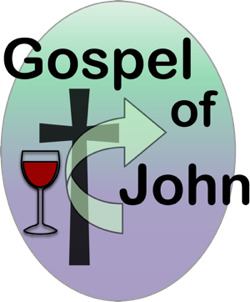
Accepted and Embraced
John 21:15-25
Moving into the Future with Jesus the Living Lord
Paul J. Bucknell
_________________________
The Bible Teaching Commentary
John 1:21:1-14 | John 1:21:1-14 Questions | John 21:15-25 | John 21:15-25 Questions
Purpose
John 21:15-25 provides a key link into the development of the early church and its leaders. The epilogue in John 21 not only provides encouragement and clarification on the disciples' appointments and roles by Christ, but connects the gospel era with the early church. Most commonly known is the three "Do you love me?" statements by Jesus to Peter.
Introductory question
What picture best illustrates the church for you? Why?
Introduction of John 21
John 21:21-25 acts as an additional word or thought outside the main body of John. There is no difficulty in thinking that John 21 is part of the Gospel of John. Instead, it provides a key link into the early development of the church and its leaders.
The epilogue in John 21 provides encouragement and clarification for the disciples. Though they now can affirm Christ’s resurrection, their recent poor performance during Christ’s crucifixion and lack of faith afterwards, stood as roadblocks hindering them from understanding or embracing God’s will for their lives.
This chapter at once reminds His key disciples to continue the work He has called them too and affirms before others their appointment by Christ. Merrill Tenney says, “The last chapter of the Gospel opens the door to the future and shows how belief should be translated into terms of daily activity.”
The only scene in this chapter is by the Sea of Tiberias and by verse 15 there are only three characters: Peter, the unnamed disciple (i.e. John) and Jesus. This is the second of the two main sections of John 21 with a common theme of ‘return and follow Me,’ a theme we can all practically apply to our lives.
Alone with Jesus: Peter, John and Jesus (John 21:15-25)
15 “So when they had finished breakfast, Jesus said to Simon Peter, “Simon, son of John, do you love Me more than these?” He said to Him, “Yes, Lord; You know that I love You.” He said to him, “Tend My lambs.” 16 He said to him again a second time, “Simon, son of John, do you love Me?” He said to Him, “Yes, Lord; You know that I love You.” He said to him, “Shepherd My sheep.” 17 He said to him the third time, “Simon, son of John, do you love Me?” Peter was grieved because He said to him the third time, “Do you love Me?” And he said to Him, “Lord, You know all things; You know that I love You.” Jesus said to him, “Tend My sheep.” (John 21:15-17).
This talk between Jesus and Peter is well known by the three times Jesus asked Peter whether he loved Him or not. After Peter’s affirmative answers, he is again charged to care for the sheep (the other disciples/believers). The importance of this scene is found in the fact that Jesus embraced Peter despite his betrayal and also re-called him to the leadership role in the church of God.
The intimate conversation between Jesus and Peter and the special play on words has fostered much meditation in the past. Jesus sensitively and yet boldly led Peter to stepping into the work He originally called him. The meaning is obvious. Peter is being called to tenderly care for the needy lambs. Peter was not being requested to go from being a fisherman to shepherd of sheep but to care for the people of God.
God’s people are referred to as sheep in a number places throughout the scriptures with good or bad ‘shepherds.’
-
David himself says, “The Lord is my shepherd” (Psalm 23:1).
-
So he shepherded them according to the integrity of his heart, And guided them with his skillful hands” (Ps 78:72)
-
“Like a shepherd He will tend His flock, In His arm He will gather the lambs, And carry them in His bosom; He will gently lead the nursing ewes” (Isaiah 40:11).
-
“Many shepherds have ruined My vineyard, They have trampled down My field (Jeremiah 12:10).
Jesus used this concept to largely define the need of God’s people for a shepherd and the need for good shepherds to care for Jesus’ sheep.
Let’s first look at these three parallel trio statements.
#1 John 21:15
Jesus’ question, “Simon, son of John, do you agape love Me more than these?”
Peter’s response, “Yes, Lord; You know that I phileo love You.” Jesus’ exhortation, “Tend My lambs.”
#2 John 21:16
Jesus’ question, “Simon, son of John, do you agape love Me?”
Peter’s response, “Yes, Lord; You know that I phileo love You.”
Jesus’ exhortation, “Shepherd My sheep.”
#3 John 21:17
Jesus’ question, “Simon, son of John, do you phileo love Me?”
Peter’s response, ““Lord, You know all things; You know that I phileo love You.”
Jesus’ exhortation, “Tend My sheep.”
The third time Peter was asked, he deeply grieved. It no doubt reminded peter of how he boasted that he would never deny Jesus. Upon Jesus third question of devotion, Peter saw that Jesus was countering his denials by enabling him to affirm his love for Jesus. Jesus didn’t get uptight about Peter’s denial and instead refocused him upon his calling.
A stretching conversation
Each trio of statements elicits a response from Peter. Peter usually was quite bold of a speaker. Just days ago he avowed that he would never deny Jesus. These bold statements were not rare with Peter. They not only made Peter cocky and vulnerable to the evil one but to be less sensitive to those who were shy and timid. Peter was being super cautious with his comments here. This ties in with the Greek words for love that Jesus and Peter used.
Each time Peter answered Jesus, he said he phileo loved Jesus. Jesus, however, was not asking that. The first two times Jesus asked if Peter agape loved Jesus, that is, was he completely devoted to Jesus Christ? Peter did not use his boastful ability to respond but a humble, friendly phileo love.
The third time around Jesus seemed to step down to Peter’s level of commitment and asked him if he phileo loved Him. Peter, quite grieving, affirms so. Peter had been shaken, but Jesus is pointing out that He knows all the past but wants him still to lead the church.
Caring for lambs
Jesus’ teaching was amazing. Notice His exhortation to Peter. He was to feed Jesus’ lambs, but Jesus was very careful to say ‘my lambs.’ Jesus would be gone (though not stated here), but Peter and the others would be put in charge of caring for the sheep. What were the implications?
Let’s examine Jesus’ exhortations a bit more closely. Jesus first tells Peter to feed His lambs. Lambs are baby sheep. They need special care. Jesus is entrusting this formerly insensitive guy to give baby care to the believers. His fall, however, seemed to prepare him for this very task. Peter could now see his weaknesses. He was careful not to boast about what he could do because he himself fell so hard. Jesus would go on and request that he shepherd the lambs.
Understanding Christian leadership
Jesus is publicly charging Peter to oversee the church, and oversee he did. Peter governed the Jerusalem church which in turn meant he oversaw all the Jewish believers in Israel. Any sense of competition was silenced because John, the disciple Jesus loved, wrote about Peter and not himself. Jesus’ special reappointment here represents the same call to all the original disciples minus Judas to avoid having their past mistakes keep them from continuing on in the service to which Jesus had called them.
In the last three years many people started following Jesus. This is the link between the Gospels and the Book of Acts, the link between Jesus and the church of God. What makes this section further interesting is Peter’s comments in 1 Peter 5.
“Therefore, I exhort the elders among you, as your fellow elder and witness of the sufferings of Christ, and a partaker also of the glory that is to be revealed, 2 shepherd the flock of God among you, exercising oversight not under compulsion, but voluntarily, according to the will of God; and not for sordid gain, but with eagerness; 3 nor yet as lording it over those allotted to your charge, but proving to be examples to the flock” (1 Peter 5:1-3).
Jesus’ words to Peter are recorded by John here at the end of the Gospel of John and largely shape the character of the church in the years ahead. Leaders of God’s people are called pastors, literally meaning shepherds, from literally all over the world crossing all sorts of cultures. Even in clear opposition to the self-esteem movement, the people of God are called sheep. God’s people need special care because they tend to wander like the Old Testaments saints of old.
A more complete picture of the church
This image of shepherd and sheep is only one picture of the church. Unfortunately, utilizing only this one picture has led to many imbalances within the church. For example, the church has developed a clergy in against the laity. The leadership is needed but the position and responsibility turned the congregation into disabled sheep in many cases.
The Reformers broke from the Catholic traditions somewhat, but by the way they applied God’s Word, the church fully did not fulfill all the images of the New Testament church including: kingdom of God, holy, Christ-like, bride, priests, etc.
It is time not to forsake the church as the Emerging Church movement seems to be doing, but to bring about a more complete understanding through all the pictures of the people of God.
In any case, the sheep belong to Jesus. Jesus is the Chief Shepherd. All the church leaders are supportive staff to Jesus in doing what is needed. At this point, most important was to set up an orderly leadership and to tenderly care for the people of God.
Summary
Jesus’ authority was quite apparent, but at the same time Jesus is reinstating His call towards Peter. This scene produced a deep soul-stretching exercise demanding Peter not to bury himself in his past failures but to focus on the needs of others around him. They need his care. Our role will be different, but in a similar way we as His disciples are called into an intimate relationship with the resurrected Christ to serve Him here on earth.
Reflection and application questions
-
 Commitment times are stretching times. Why? What are some of the deep issues that are brought about when commitments are being sought out? Reflect on your past struggles as necessary.
Commitment times are stretching times. Why? What are some of the deep issues that are brought about when commitments are being sought out? Reflect on your past struggles as necessary. -
Who is the leader of the church? Whose lambs are they? Who is to watch over them? How do you know?
Conclusion of John 21:24-25
“24 This is the disciple who is testifying to these things and wrote these things, and we know that his testimony is true. 25 And there are also many other things which Jesus did, which if they were written in detail, I suppose that even the world itself would not contain the books that would be written” (John 21:24-25).
John identifies himself through his discipleship. It is a humble way and perhaps a literary device to snag the interest of the audience. Most important is John’s identifying himself as an eye witness. This serves as firsthand evidence not only of Jesus’ words, miracles but also His death and resurrection.
The phrase ‘his witness is true’ probably does not refer to John’s witness through the book, although that is undoubtedly true, but of the words Jesus spoke. Jesus’ witness is true. All He spoke is true and can be trusted. Jesus’ words should provide for us not just a superficial religious attachment but a personal change.
This conclusion is somewhat verified by the following words in verse 25. What Jesus said and did were important. John only included some of these events as mentioned earlier. John only recorded seven miracles as signs pointing to affirmation of Christ’s claims. He could have gone on. John was overwhelmed by all that happened and so he came up with a metaphor ‘even the world would not contain the books which were written.”
General Application
Jesus not only restores and reestablishes the disciples as leaders of this new people of God, but by his words with Peter shapes the character of the ministry. Jesus is the True Shepherd, but the disciples need to do shepherding. They are commissioned to feed and care for the people of God.
The people of God are portrayed as a flock of sheep, even lambs. They are not to aimlessly go about but to be nourished. Jesus does not speak about the Word of God, that which they and we are to be fed, nor the Spirit of God, which He so carefully elaborated on in earlier chapters. These things were not as basic and crucial as laying down the vision of the church and its proper care.
Reflection and application questions
-
What are your views of the church? Of your own life? Do you need a shepherd? Why?
-
What is it that you need feeding with? Why is this important?
-
How do we treat those shepherds (pastors) that God appoints over us?
-
Are you familiar with those who look down on the church? Did Jesus? What might Jesus say to those people who say they follow Jesus but are unwilling to be part of a local church?
Click here for Bible study questions on John 21:15-25.
BFF has a library of New Testament materials literally waiting for your exploration!
A video and handout of this lesson is available on the BFF New Testament Library - see below.
Or see BFF's Resource Center for purchasing this low cost Library along with BFF's quality training material. |
info@foundationsforfreedom.net
Scriptures typically quoted from the New American Standard Bible unless noted:
(C) Copyright The Lockman Foundation 1988











